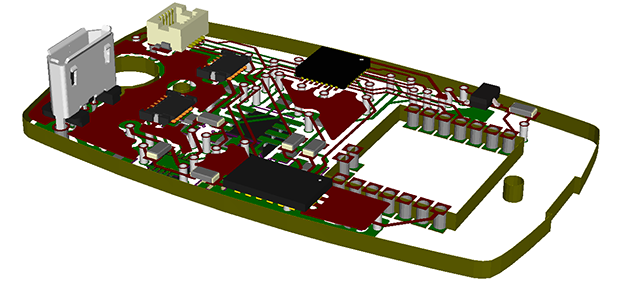For somewhat obvious reasons, there aren’t many medical hacks making their way to the quarterfinal selection of The Hackaday Prize. One exception to this is [Thomas]’ Hypoglycaemia Alert System, a Bluetooth device that detects low blood sugar in sleeping diabetics and calls for help.
This isn’t the only blood glucose monitor that made it to the quarterfinals of The Hackaday Prize. [John Costik] reverse engineered a continuous glucose monitor for his Type 1 son (we also did a hacker bio on him). This project has a slightly different scope and doesn’t rely on pre-existing blood glucose sensors. In fact, it doesn’t detect glucose at all. Instead, it uses humidity and temperature sensors to detect the heavy sweating that often occurs with low blood glucose levels.
This hypoglycaemia monitor is meant to be worn by a user at night. Glucose levels can drop while sleeping, and if they drop too low blood sugar can result in death. When the monitor detects the symptoms of low blood glucose, it connects to a smartphone through a Bluetooth link and sends an SMS alert to phone numbers in the contact list. Whoever receives this message will then try to wake the potentially unresponsive diabetic, and failing that, would put some cake frosting under their gums (Seriously. Ask a police officer/EMT for cake frosting. The good ones have some).
[Thomas] is well on his way to a functional device despite having a few problems with his enclosure. Right now he’s working on the Bluetooth comms part of the build, and we hope a complete, working device is right around the corner.
 The project featured in this post is a semifinalist in The Hackaday Prize.
The project featured in this post is a semifinalist in The Hackaday Prize.
















Hmm…i believe when you have “advanced” symptoms like sweating, your bloodsugar is usually already quite below your normal low-threshold. Of course YMMV and it’s still better than no alarm at all, but i wouldn’t want to rely on this :(
Why not try to wake the subject while it should still be possible, so that he can solve the impending problem himself (either by eating or injecting glucose intravenously), instead of waiting until he is in actual danger (unconscious) and needs external help?
And the lack of medical hacks should be obvious…
I did have a version that had an optional alarm that could go off, but in general by the time the sweat is detected, the situation is pretty bad. It’s not intended to stop the condition from happening (and detection is nowhere near consistent enough to rely on it), but to alleviate the effects somewhat by getting help faster. Making a medical device that people rely on to control their diabetes just isn’t practical for liability reasons, and so this isn’t aimed in that direction.
Cool idea but I would never trust a bluetooth connection with my life. Its so incredibly unstable on phones and never comes back when you loose the signal just once, without re-pairing.
Can you get surface-mount Pez dispensers?
I’m an EE, an Advanced Life Support EMT, and the husband of a diabetic. I think the idea has promise, but inserting cake frosting into the mouth of someone unresponsive is frowned upon because of the aspiration risk. We carry tubes of oral glucose, which works even better, but we only use it on patients that can guard their own airway. Glucagon auto-injectors are now available (built like EPI-pens) and you may soon be able to obtain a Glucagon nasal spray that works about as well.
I didn’t say it was the best thing. It is, however, the cheapest sugar gel that can be bought for a dollar at any supermarket.
Or you could just say ‘yeah, you’re right’ instead of looking like a tit.
Father of diabetic, former husband of diabetic, and EMS too… I too disagree with cake frosting; our ambo’s carry lemon flavored glucose gel (cherry stains patients clothing), and I carry honey packets from KFC- the active sugar in honey will raise the blood sugar almost 25% faster than most sugars.
[Brian] this quarter finalist thing again. You keep on calling it quartefinals, so maybe you should just rename the semifinalist list to quarterfinalists, you know, bump everyone back and skip the semi’s and go directly to the finals…. :D
Personally I feel that all diabetics should be able to get a continuous monitor implanted at little or no cost. Blood sugar levels are critical for health.
I think using a humidity sensor alone will lead to a lot of false negatives and positives. I would suggest pairing that with galvonic skin resistance to get more reliable alerts. Temperature sensor may help as well.
“For somewhat obvious reasons, there aren’t many medical hacks making their way to the quarterfinal selection of The Hackaday Prize.”
Brought to you by the same people who thinks it’s still a fresh idea to use the raspberry pi as a gaming console.
Bluetooth never works…. never ! i don’t even trust bluetooth to answer my calls …. life support ??? i know it’s not that critical but hey.. Why not just start buzzing ?
“For somewhat obvious reasons, there aren’t many medical hacks making their way to the quarterfinal selection of The Hackaday Prize.”
Can someone fill me in on what the “obvious” reasons are?
The FDA.